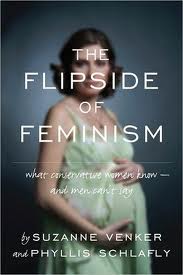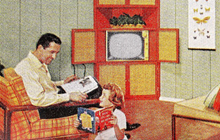As the movement has grown and developed, it has gained certain tenets as its defining issues and beliefs. But not everyone wants to hold on to the full “banner” of feminism. Many in our day today are calling for the label “feminism” to be abandoned completely. They hold that many of the same desires or goals can be accomplished without confusing the cause with some of the “baggage” that now comes along with the title, “feminism.” While particularly true in the Conservative area of political life, this is a growing concern among many moderates on both sides of the political spectrum.
Much of the reaction to the liberal feminism of the modern age is rooted in the Judeo-Christian perspective that is still quite prominent in our culture. That perspective asserts the long-running view that (1) God made us male and female, equal but different; that (2) in those differences are different elements of vocation that gender engenders, especially as relating to the having and raising of children and the ordering and provisioning of family life; and that (3) all vocations in the succession of life’s seasons are to be valued, but as relating to the nurture and care and flourishing of the rising generation, “the hand that rocks the cradle rules the world.”
These views are rooted in the Bible. It states that God made humankind as two genders, male and female (Genesis 1:27). The Bible instructs the flow of love and service that typify a Christian household as one of mutuality and fidelity in passages such as Ephesians 5:21-33. Male and female roles are defined and explained within the greater context of service and sacrifice for the mutual enjoyment and good of each individual and the whole of the family. The love Christ showed here on earth is embedded into the reality of the biblical marriage.
But in addition to these being statements of biblical principle, they reflect principles of Natural Law (the way things work, or don’t, in the world). In other words, to diminish any of these principles moves us in opposition to the grain of the created order. The adoption of ideas and ideals in opposition to these principles will diminish human flourishing. Thus, for many, liberal feminism has sought to exceed or fundamentally change the created order of gender roles and relationship, thereby putting our pursuit of the best life at great risk.
In the following video, The Flipside of Feminism co-authors Suzanne Venker and Phyllis Schlafly (now in her 90’s!) discuss this view. The two propose that now is the time to move beyond “feminism” to something more constructive, and more unifying.
While the drive toward equal opportunity and equal rights for women is viewed almost universally by Americans as a positive advance in our society, feminism became politicized and popularized in ways that have now associated the term with “radical liberal feminism” – a movement that is now often trivialized in relation to the great principles of equality it set out to advance.
This is due to a number of things, but many people now view feminism in relation to a broader ideology of victimization and political power, and so the conversation about gender equality can become belligerent quite quickly. Here’s a parody about this trivialization, labeling, presumptions, and the conversational conflict that surrounds the radicalization of the women’s equality movement:








